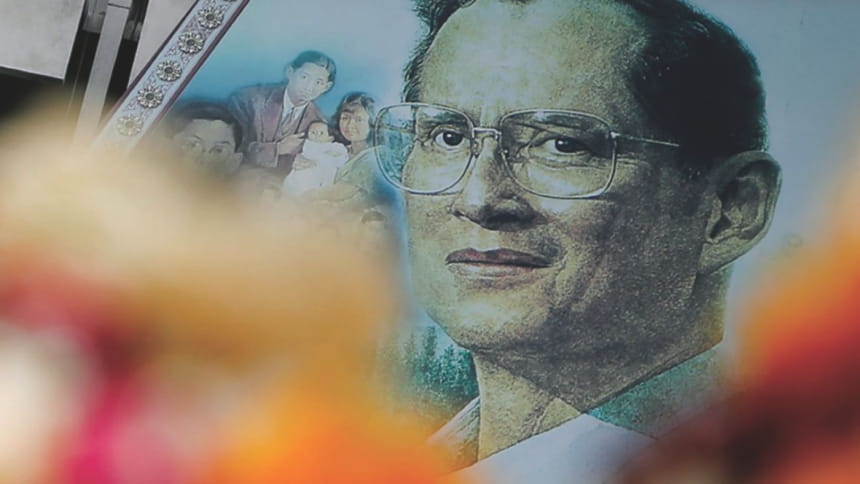A foreigner's perspective

Having visited Thailand for over five times during my lifetime, I would like to believe that I learnt quite a lot about the country and its culture. Its booming tourism industry and ever growing clothing market are attractive to travellers and foreign investors alike. Amidst the topsy-turvy journey of Thailand into the modern epoch of the 21st century, a guardian remained constant. A beacon of light who guided Thailand through its best and worst periods, King Bhumibol Adulyadej served as the sovereign ruler for seven long decades. That light has now faded away.
Every time one walks into a theatre in Bangkok and indeed around the entire country, what preludes the movie is quite fascinating for foreigners to observe. A short film showing the king travelling throughout the rural areas of Thailand, portrays this American born man as a divine demi-God. What is even more interesting is that it creates an innate sense of adulation for the king, even to the average Bangladeshi like me. When you walk through the streets of the capital, you see a picture of the king in almost every shop. His birthdays are a day of national celebration, where people from all sides of the political divide show up and sing praises of the king. Although I do not know whether this will continue for Bhumibol's heir, it is safe to say that no one in Thailand was more loved and admired by the people then their head of state.
So what do I know about Thailand? What do I know about politics? What does a 21-year-old University of Toronto student know about foreign kings and their legacies? Well firstly, never do I claim to be an expert on these issues nor am I well-educated about the life of King Bhumibol. In fact, his name hasn't even been mentioned once in my history or political science courses. But that is where his greatness lies. He touched my heart without being in anyway remotely associated with my life. And that is exactly what he did with the people of Thailand. He reached out to them, became the people's king. Personally overseeing and funding rural development projects in an underdeveloped Thailand in the mid-20th century may have been a drastic measure designed by the Thai establishment to boost public confidence, but it worked wonders. Thais saw their king working hard, and felt it was their duty to serve him by working hard themselves. The king's love for jazz and his interest in photography made him seem contemporary to the average Thai.
Internationally, King Bhumibol had the reputation of an astute unifier, an ally to the West and a truly great statesman. Having said that, it would be surprising to know that Bhumibol in constitutional terms had no political power. Yet in Thailand's many political conflicts, both the Thai people and politicians looked up to their king for guidance and stability. The 1992 image of the Thai Prime Minister and the man trying to overthrow him, kneeling before their king, as he commanded them to end the political turmoil has gone down in history as one of Bhumibol's most incisive moments. For many, the controversial Lèse-majesté (based on Thai Criminal Code Section 112, making it illegal to defame, insult or threaten the king, queen, heir-apparent or regent) might seem like a farce to democracy. And indeed, in all theoretical sense, it is. It prevents individuals from criticising the king and has been used by Thai governments to punish political dissidents. Nevertheless, it is unjust to consider that the man known to be the greatest unifier in Thailand was personally responsible for employing this controversial policy. In fact, even those who want monarchies around the world to be abolished, commonly agree that Bhumibol's sense of duty to his people gives him much deserved credibility. What is there to criticise about him? Yes, the concept of a monarchy is something which I personally do not approve of, yet it has worked magnificently in Thailand. And the only reason it has done so, is because of the efforts of their king.
King Bhumibol touched the hearts of his people, and he touched mine. Seventy years of serving a nation and its people, even amidst the luxurious life he did lead, is not a matter of joke. I only wish we learn about public service, loyalty to the people and dedication from this truly modern king. And yes, maybe it is time for Bhumibol's name to be in my history and political science books, because men like him should be remembered.
A king of duty, a king of the people - the heart and soul of Thailand. His legacy must live on. May King Bhumibol rest in peace.
The writer is a student of Economics and International Relations, University of Toronto.

 For all latest news, follow The Daily Star's Google News channel.
For all latest news, follow The Daily Star's Google News channel. 



Comments